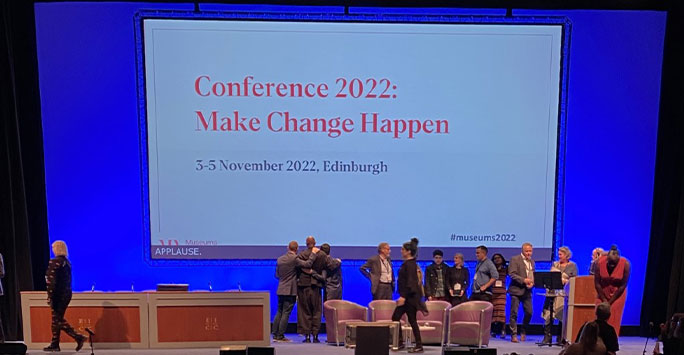
“Make change happen” was the name of 2022 edition of the Museum’s Association Conference. I thought the name of the conference resonated well with the conference’s 2021 edition entitled “Brave New World”. Yet, this year’s title was more provocative. The title urged participants to actively engage with the major issues facing museums today. The speakers spurred listeners to become activists, not mere listeners.
A glance at the programme is enough to identify the focus of this year’s conference. Colonial histories, sustainability, and representation. Whilst these themes were already present in 2021, there was a definite shift in tone. Panels focused more on delivering clear calls for action. During the “collaborative approaches to restitution” panel, Dr Rudo Sithole, Director of African Museums and Heritage Restitutions, described the ongoing debate about restitution “absolutely ridiculous”. She aptly reminded the audience that webinars and conferences could not replace museums enabling restitution. Njoki Ngumi, artist at the Nest Collective, highlighted the pressure put on Black restitution activists who, coming to meetings in Western museums, are expected to put aside any sense of pain or injustice but rather show gratitude when discussing restitution. The overall sense of urgency, responsibility and institutional activism made this both a vital presentation and a fitting topic for the aims of this year’s conference. Questions from the audience were met with the same tone – debates around restitution should give place to active return policies across the West.
Attending in person for the first time, I found that the strength of the conference lay in the openness of the speakers, backed by their willingness to go against their institutions when needed. Furthermore, the variety of professional voices represented and the attempt at sharing concrete evidence of museum change offered a deeper look into UK museums as spaces of institutional power. And yet, the choice of location for each panel got me thinking about the programme and the event’s organisation. A grand auditorium hosted the “main sessions”, such as the excellent “Permissible Beauty” film screening, or a panel on the role of museums in times of heightened political conflict. By contrast, “Reclaiming the narrative – violence against women and girls” took place in a smaller side room. The panel explored how museums could highlight domestic abuse. The room was cramped, many members of the audience sat on the floor. Whilst the panel itself was thought-provoking, I couldn’t help wondering why certain themes had been allocated to smaller rooms – there seemed to be a subliminal hierarchy suggested by the programme.
This is not to minimise the discussions in the auditorium. Author Elaine Egurian delighted the audience with a whistle-stop talk about the changes in museum workforce since Covid and institutions such as the Wellcome Collection and Black Cultural Archives shared their current projects focusing on racism in science. Q&As saw anxious members of the public inquiring how they could implement change in their institutions. This gives us hope that the ideas that drive “Make Change Happen” will outlast the challenging conversations of this year’s conference.